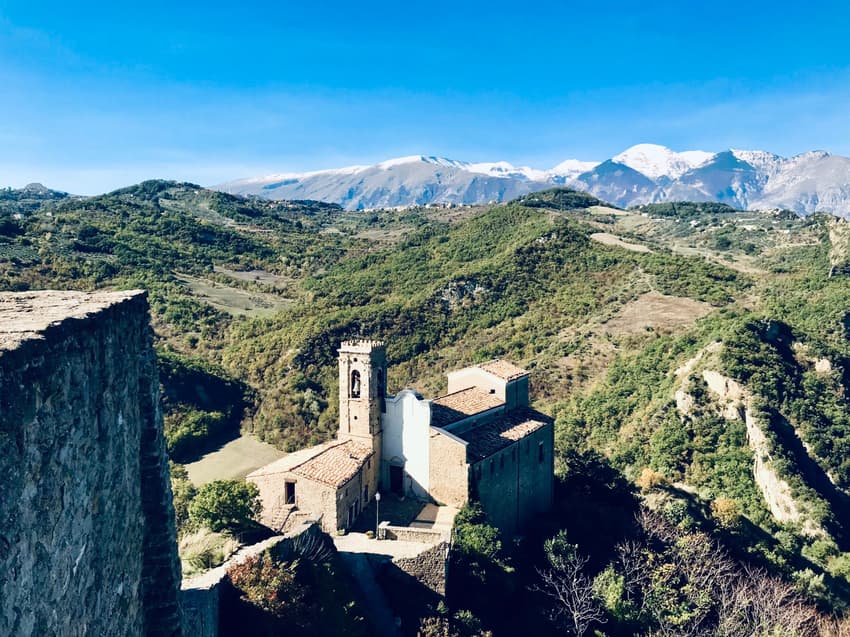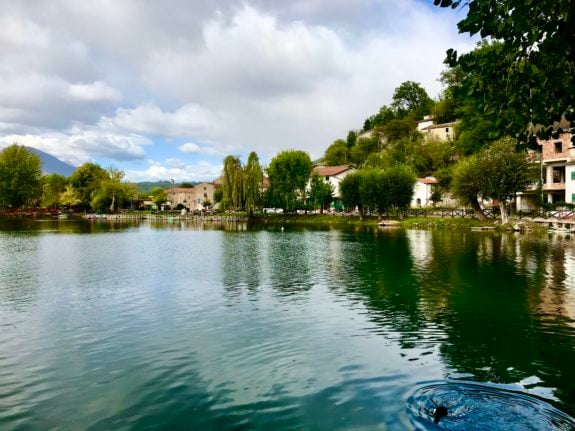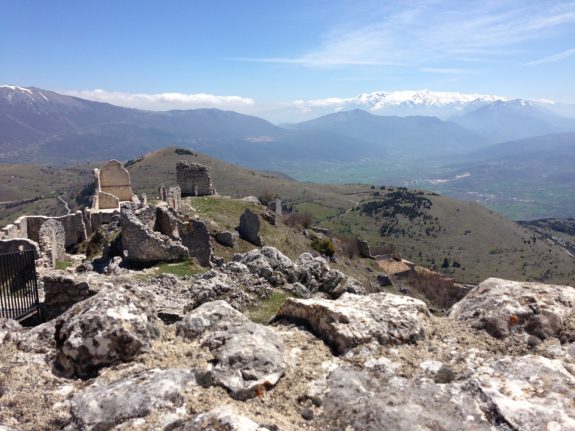TRAVEL: Why now’s the best time to discover Italy’s secret lakes and mountains

Longing to escape the crowds and heat to experience a different side of Italy this summer? Those who look beyond the usual destinations are richly rewarded, says Silvia Marchetti.
As Italian beaches are experiencing a fast post-pandemic revival of tourists longing to swim in clear waters and sunbathe on powder-white sand, there’s a more niche group of international travelers who are opting instead for alternative destinations. And with good reason.
A recent survey by Milan’s Cattolica University found a 60 percent increase in the number of foreign tourists visiting or planning a holiday at Italian lakes and mountain areas, particularly in under-the-radar locations holding greater allure for those looking for 'secret' retreats.
Talking to several Americans planning a holiday in Italy recently, I realized they were all eager to get away from the usual VIP lakes: Garda, Maggiore and Como, which although stunning, are usually overcrowded, pricey and overly-chic.
They asked for tips on where to go for a stay in pristine natural surroundings to escape from the heat, to bike around tiny lakes, go fishing, and enjoy trekking along solitary mountain trails far from the usual spots.
Beyond the traditional destinations everyone chooses, Italy is packed with stunning lakes and quiet mountain parks unknown even to most Italians, which are eclipsed by the more popular locations.
READ ALSO: Why visitors to Italy are ditching hotels – and where they’re staying instead
These gorgeous, smaller lakes are ideal in guaranteeing social distancing in the time of Covid, and offer no shortage of fun stuff to do.
I recently discovered Lago di Tora in the province of Rieti, near Rome, and felt ashamed that I had never seen it before given that it's a stone’s throw from where I live in the countryside.
Two picturesque clifftop medieval hamlets of cropped stone dwellings with panoramic balconies overlook a sparkling-green artificial lake built in the 1930s to supply energy to nearby power plants. One single bridge connects the main road to the oldest village, Castel di Tora, where fresh fish is the main delicacy.
The view is fabulous, and there are beach facilities with dinghies and canoes to rent. Local authorities are boosting sustainable post-pandemic tourism projects with guided fishing boat tours, giant carp fishing competitions (it's just for sport: the carp are then thrown back into the water), and bike tours along the shores.
A kilometer away, in the same area, is the Lago del Salto, a windy secret spot for kite surfers and jet-ski lovers who get to run wild on the waves without fear of crashing into sunbathers.
Other off-the-beaten-path lakes I strongly recommend visiting are the heart-shaped Lago di Scanno in Abruzzo, where there are underwater magnetic fields; the tiny Lago di Martignano in Latium which is a former volcano crater and has dog beaches; and Posta Fibreno lake, an exotic-looking, hidden jewel in the wild Ciociaria area where you can stay at small B&Bs and rent paddle boats.

Lago di Posta Fibreno, Ciociaria. Photo by Silvia Marchetti/The Local
I think there's something cool and 'counter-current' in not following the beach fad in summer and instead heading to remote lakes, and in particular to mountain arrss that are crowd-free now that skiing season is over and come with a pure oxygen intake for your lungs.
I strongly recommend heading to Abruzzo's Apennine mountains, dotted with crumbling panoramic fortresses like Rocca Calascio, ghost hamlets and impressive cliff-hanging castles including the one in the secluded village of Roccascalegna.
Abruzzo national park authorities have boosted guided trekking tours into the wilderness for nature-amateurs, and even organize (safe) bear-watching day trips that allow groups of hikers to admire from a distance the beauty of the 'orso marsicano', an endangered, protected species. The unique side of this adventure is you get to do it only in summer, when there's no risk of getting stuck in ice, snow or blizzards.
READ ALSO: OPINION: Mass tourism is back in Italy – but the way we travel is changing

Rocca Calascio ghost fortress in Abruzzo’s Parco del Gran Sasso. Photo by Silvia Marchetti/The Local
Other awesome mountainous areas are the unknown Apennines at the border of Liguria and Piedmont (yes, one might think those are the Alps), close to Genoa but part of another universe, where time stands still, like in the villages of Fascia and Carrega Ligure.
In this secluded corner of northern Italy, panoramic mountain trails connect little hamlets where people live in their grandparents' thick-walled stone cottages and call out ‘ciao’ from their windows.
There are just a few bars, no social buzz but rewarding views and opportunities for great 'scampagnate': outdoor time with picnics and hikes to isolated mountain huts turned into gourmet taverns serving traditional dishes, such as fried frogs and snails for the daring.
READ ALSO: Exploring Bologna’s hidden countryside by bike
We need - and I mean us Italians first of all, but also foreigners - to get over the idea that Italy is just islands, bays, gulfs and beaches. The sea is our most precious jewel, but it's not the only tourist asset.
There are other 'uncommon' destinations in Italy offering diverse experiences, and these should be exploited more. Many foreigners, particularly those who love camping, tend to appreciate lakes and mountains more than coastal locations and long to discover these new landscapes.
Comments
See Also
As Italian beaches are experiencing a fast post-pandemic revival of tourists longing to swim in clear waters and sunbathe on powder-white sand, there’s a more niche group of international travelers who are opting instead for alternative destinations. And with good reason.
A recent survey by Milan’s Cattolica University found a 60 percent increase in the number of foreign tourists visiting or planning a holiday at Italian lakes and mountain areas, particularly in under-the-radar locations holding greater allure for those looking for 'secret' retreats.
Talking to several Americans planning a holiday in Italy recently, I realized they were all eager to get away from the usual VIP lakes: Garda, Maggiore and Como, which although stunning, are usually overcrowded, pricey and overly-chic.
They asked for tips on where to go for a stay in pristine natural surroundings to escape from the heat, to bike around tiny lakes, go fishing, and enjoy trekking along solitary mountain trails far from the usual spots.
Beyond the traditional destinations everyone chooses, Italy is packed with stunning lakes and quiet mountain parks unknown even to most Italians, which are eclipsed by the more popular locations.
READ ALSO: Why visitors to Italy are ditching hotels – and where they’re staying instead
These gorgeous, smaller lakes are ideal in guaranteeing social distancing in the time of Covid, and offer no shortage of fun stuff to do.
I recently discovered Lago di Tora in the province of Rieti, near Rome, and felt ashamed that I had never seen it before given that it's a stone’s throw from where I live in the countryside.
Two picturesque clifftop medieval hamlets of cropped stone dwellings with panoramic balconies overlook a sparkling-green artificial lake built in the 1930s to supply energy to nearby power plants. One single bridge connects the main road to the oldest village, Castel di Tora, where fresh fish is the main delicacy.
The view is fabulous, and there are beach facilities with dinghies and canoes to rent. Local authorities are boosting sustainable post-pandemic tourism projects with guided fishing boat tours, giant carp fishing competitions (it's just for sport: the carp are then thrown back into the water), and bike tours along the shores.
A kilometer away, in the same area, is the Lago del Salto, a windy secret spot for kite surfers and jet-ski lovers who get to run wild on the waves without fear of crashing into sunbathers.
Other off-the-beaten-path lakes I strongly recommend visiting are the heart-shaped Lago di Scanno in Abruzzo, where there are underwater magnetic fields; the tiny Lago di Martignano in Latium which is a former volcano crater and has dog beaches; and Posta Fibreno lake, an exotic-looking, hidden jewel in the wild Ciociaria area where you can stay at small B&Bs and rent paddle boats.

I think there's something cool and 'counter-current' in not following the beach fad in summer and instead heading to remote lakes, and in particular to mountain arrss that are crowd-free now that skiing season is over and come with a pure oxygen intake for your lungs.
I strongly recommend heading to Abruzzo's Apennine mountains, dotted with crumbling panoramic fortresses like Rocca Calascio, ghost hamlets and impressive cliff-hanging castles including the one in the secluded village of Roccascalegna.
Abruzzo national park authorities have boosted guided trekking tours into the wilderness for nature-amateurs, and even organize (safe) bear-watching day trips that allow groups of hikers to admire from a distance the beauty of the 'orso marsicano', an endangered, protected species. The unique side of this adventure is you get to do it only in summer, when there's no risk of getting stuck in ice, snow or blizzards.
READ ALSO: OPINION: Mass tourism is back in Italy – but the way we travel is changing

Other awesome mountainous areas are the unknown Apennines at the border of Liguria and Piedmont (yes, one might think those are the Alps), close to Genoa but part of another universe, where time stands still, like in the villages of Fascia and Carrega Ligure.
In this secluded corner of northern Italy, panoramic mountain trails connect little hamlets where people live in their grandparents' thick-walled stone cottages and call out ‘ciao’ from their windows.
There are just a few bars, no social buzz but rewarding views and opportunities for great 'scampagnate': outdoor time with picnics and hikes to isolated mountain huts turned into gourmet taverns serving traditional dishes, such as fried frogs and snails for the daring.
READ ALSO: Exploring Bologna’s hidden countryside by bike
We need - and I mean us Italians first of all, but also foreigners - to get over the idea that Italy is just islands, bays, gulfs and beaches. The sea is our most precious jewel, but it's not the only tourist asset.
There are other 'uncommon' destinations in Italy offering diverse experiences, and these should be exploited more. Many foreigners, particularly those who love camping, tend to appreciate lakes and mountains more than coastal locations and long to discover these new landscapes.
Join the conversation in our comments section below. Share your own views and experience and if you have a question or suggestion for our journalists then email us at [email protected].
Please keep comments civil, constructive and on topic – and make sure to read our terms of use before getting involved.
Please log in here to leave a comment.